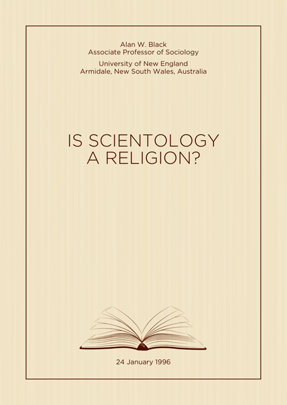
-
HOME
-
WHAT IS STANDOur Mission Our Values Our Help Contact
-
WHAT WE FIGHT FORReligious Freedom Religious Literacy Equality & Human Rights Inclusion & Respect Free Speech Responsible Journalism Corporate Accountability
-
RESOURCESExpert Studies Landmark Decisions White Papers FAQs David Miscavige Religious Freedom Resource Center Freedom of Religion & Human Rights Topic Index Priest-Penitent Privilege Islamophobia
-
HATE MONITORBiased Media Propagandists Hatemongers False Experts Hate Monitor Blog
-
NEWSROOMNews Media Watch Videos Blog
-
TAKE ACTIONCombat Hate & Discrimination Champion Freedom of Religion Demand Accountability

Is Scientology a Religion?
BY ALAN W. BLACK, PH.D., ASSOCIATE PROFESSOR OF SOCIOLOGY, UNIVERSITY OF NEW ENGLAND, ARMIDALE, NEW SOUTH WALES, AUSTRALIA
Synopsis:
Is Scientology a religion? Yes, without a doubt, as Scientologists themselves attest on the basis of the benefits they receive from the Church’s theology, practices and community life. But what counts as a religion in the first place? What are its characteristics and manifestations? In this article from 1996, Professor Alan W. Black provides sociological criteria by which religions are conventionally identified, for instance by practices and rituals, religious experiences, cosmic or mythic narratives, philosophy and doctrine, ethical systems, social and institutional structures, and the materiality and functionality of church buildings. Based on his own in-depth research of Scientology’s scriptures, theology and religious life, Dr. Black answers the question in the title of his piece with resounding affirmation. “For the reasons given in the preceding analysis,” he concludes, “I consider that Scientology is rightly regarded as a religion. As well as having the salient generic characteristics that typify recognized religions, Scientology has its own distinctive features—particular beliefs and practices that mark it out as a different religion rather than a non-religion.”

